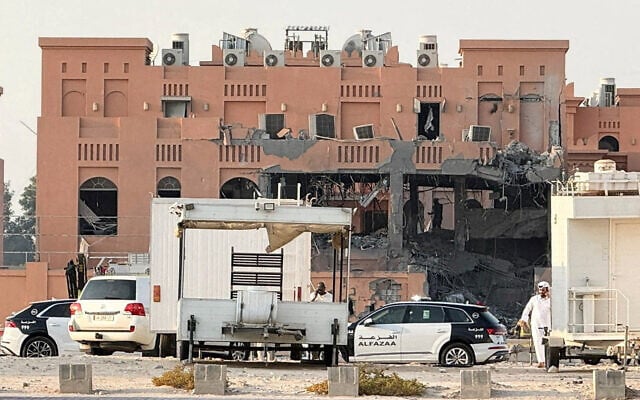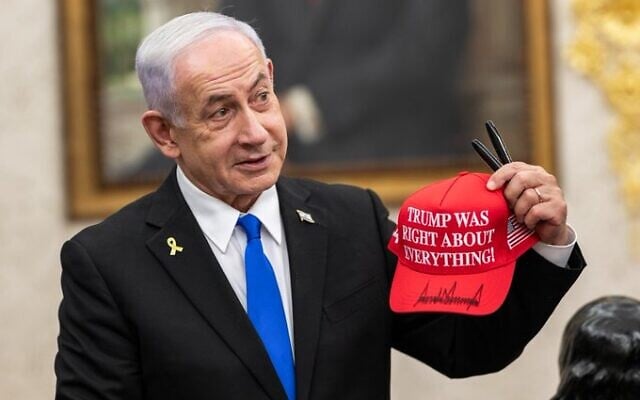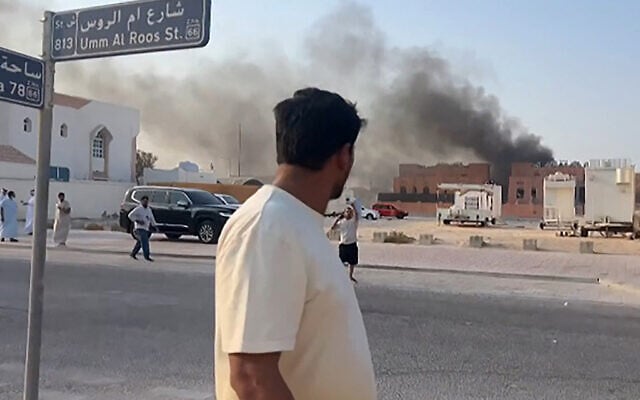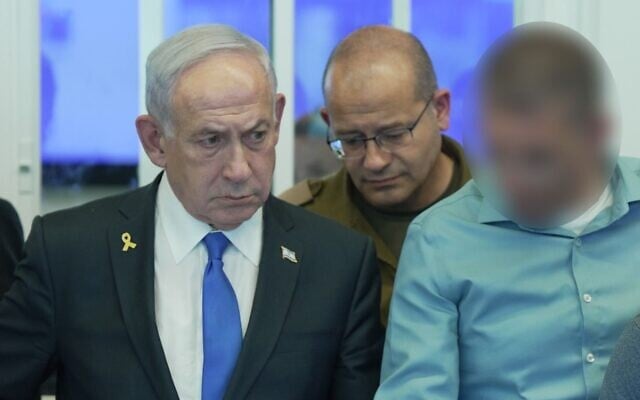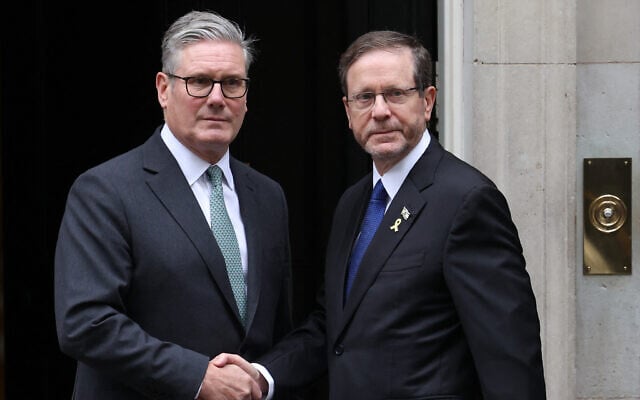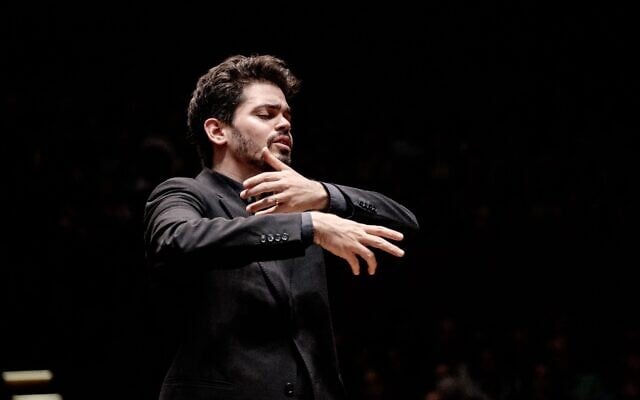


Amanda Borschel-Dan: Welcome to the Times of Israel’s Daily Briefing. Today is Thursday, September 11, day 706 of the war.
Amanda Borschel-Dan, down here in our Jerusalem office with The Times of Israel’s Editor, David Horovitz.
Always a pleasure to see you in person, David.
David Horovitz: Thanks, Amanda.
Amanda Borschel-Dan: Prime Minister Benjamin Netanyahu took a gamble with Tuesday’s Israel Air Force’s attack on Hamas leadership in Qatar, and we actually still don’t know the results. How much was the United States in the know before or even during the attack? And what happens if this gamble to take down Hamas’s politburo is indeed a misfire? We’ll also discuss President Isaac Herzog’s tough meeting in London with British Prime Minister Keir Starmer. We’ll speak a little about what it means to be an Israeli artist on the international stage, and we’ll learn about Charlie Kirk, who was assassinated yesterday in Utah, and his pro-Israel work. All this and more when we’re back.
I’m Amanda Borschel-Dan, down here in our Jerusalem office with Editor David Horovitz. Before we delve in, first a few words on Charlie Kirk. He was a top conservative podcaster, pro-Israel culture warrior, and ally of US President Donald Trump. Charlie Kirk founded Turning Point USA, and he was shot and killed Wednesday during one of his trademark public appearances at a college in Utah. He was 31. Although Kirk had a history of accusations of anti-Semitic statements by his critics, as an evangelical Christian, he was avowedly pro-Israel and often debated the Gaza War with college students and others in videos shared online. Upon news of his assassination, Prime Minister Netanyahu issued a statement saying, “Charlie Kirk was murdered for speaking truth and defending freedom. A lion-hearted friend of Israel, he fought the lies and stood tall for Judeo-Christian civilization.” David, let’s turn to Israel’s attack on Hamas leadership on Tuesday in Qatar, and more than any other aspect of it, I’ve been puzzled over whether the US was indeed kept in the dark or not. In your Wednesday op-ed, you presented what we know so far.
David Horovitz: Yeah, I mean, it’s interesting, isn’t it, that as we speak almost 48 hours after the event, we don’t know so much about it. I mean, we know what Israel attempted to do, we know how it did it, although I’m not even convinced that we know exactly what munitions were used and fired where from. We think we know, and we’ve reported what we know, of course, but we certainly don’t know the definitive result. The last credible reporting is, I mean, first of all, that Israel is behind the scenes saying as of right now that it does not have definitive information about who, if any, of the key Hamas leaders that it targeted were killed. There was optimism initially, and there’s less optimism as time has passed, but there’s a fairly credible Saudi paper that claims that at least one of the top leaders is badly injured and another also injured.
There have been suggestions, including in that Saudi report, that the room in which they were meeting is a room into which they did not take their phones, and it may have been the phones that Israel was using to see exactly where they were. Israel talked about very precise strikes. Israel was trying not to kill anybody who was not a target. There are some echoes of that in attacks on Hamas leaders in Gaza many, many years ago, including a major meeting of Hamas leaders where Israel decided not to blow up a building and rather used less powerful munitions, shall we say, and people emerged unscathed because Israel had not wanted to kill non-combatants. It might be that that’s part of the equation, but again, we don’t know. Then what you ask, which I tried to tackle in an Op-ed yesterday, there are so many questions about the assertion, the statement by people in the Trump administration and President (Donald) Trump himself that he and they were not told by Israel that it was going to carry out this attack. That sounds so both implausible and unfeasible, and in fact, it is not feasible. I’ll explain what I mean by that in a minute. However implausible, that is what is being asserted. That’s really quite something, the notion that Israel would attack the legitimate targets, Hamas leaders, terrible people, inside the territory of a sovereign state that is an American ally, whatever Israel’s conflicted relationship with it.
Moreover, those who were about to discuss or may be discussing a ceasefire hostage proposal. I think there’s some suggestion that there were two sets of meetings. The first meeting was not on the ceasefire. There was about to be a second meeting, et cetera. A lot of stuff is unclear, but you’ve got Israel having an interest in negotiations, which are being mediated by Qatar, the United States and Egypt, and then targeting the other side as the incandescently furious Qatari Prime Minister (Mohammed bin Abdulrahman bin Jassim Al Thani) has said. To do that without coordinating it with the United States, I imagine that Israel knew that if they did try to coordinate it, the Trump administration, the President would say, no, please don’t do that. Trump has said, worthy target, the Hamas people, but don’t be doing it at that location. These are people, he’s very up on Qatar. Lazar Berman, our diplomatic reporter in February in the Oval Office asked Trump, who had previously talked of Qatar as a funder of terrorism.
Of course, it’s the funder of Al Jazeera [Qatari-state run news network], which is an inciter of terrorism. Lazar asked the President, Is Qatar part of the problem or the solution? And Trump was adamant, no, part of the solution. However implausible it may sound, that is the definitive narrative by the President of the United States that America was not told. In terms of the feasibility of doing something like this without the Americans knowing, of course, the Americans did realize, again, according to what we’re being told, they saw Israeli attackers approaching, came up on their radar, and then they asked Israel if we know what was going on. Israel said, yeah, we’re about to, we’re striking in Qatar at this target. I don’t know the specifics of what was said, but yes, the Americans caught on, but they caught on very late.
And it’s not entirely clear whether Trump tried to reach Netanyahu, although it may turn out that that was the case, that’s what he did at the very end of the Iran war in June. He got very angry that he thought Israel was attacking Iranian targets after the ceasefire had come into play. It was quite a complicated timeline, and he may not have quite realized what was going on, or maybe he did. Anyway, he reached out to Israel, and the planes on the last attack turned around. Was he unable to reach Netanyahu? Did he try to reach Netanyahu? I think we’re going to know about that. And he tried to, you know, he asked Steve Witkoff [US special envoy to the Middle East] to tell the Qataris, which according to Trump, and according to the Qataris, they only got that word too late when the attack was already in play. So it’s really, it’s quite a staggering story. And we still have some pretty crucial aspects of it, including did it work? How successful was it? That we just don’t know yet.
Amanda Borschel-Dan: Do you think that it was Israel just taking, seizing the moment, meaning the Hamas leadership was all assembled, it was a very rare situation in which they’re all together, and this was the perfect target? Or do you think it was Israel that was treating Qatar just as it treats any other, you know, non-friendly state to Israel, such as Yemen, right? Even yesterday, after this Qatar attack, Israel went and staged another attack on Yemen. So which of these scenarios do you think it was?
David Horovitz: So I don’t think Israel looks at Qatar exactly like Yemen, which, or the Houthis in Yemen, which are an avowed enemy with no redeeming or ameliorating aspects, certainly not an ally of the United States, for example, that keeps attacking us. Qatar is more complicated. I mean, Netanyahu has been very wary about how he defines Qatar. It’s not an enemy state. And as we know, several of his aides are suspected of having taken money from Qatar to advance its interests, which is a huge scandal here that we’ve talked about many times. But after the attack, including yesterday, so the day after the attack, he was pretty hard line and unfazed, shall we say. He has some warm remarks about President Trump as Israel’s, you know, the best friend and so on.
But he was not saying, “Hey, I’m really sorry, we shouldn’t have done it. I’ve upset the president.” He was saying, “You know, the timing.” In particular, he referenced the Jerusalem terror attack, six people killed on Monday. And I’m sure that was somewhere in the mix. So it’s not it’s not an either or. It’s also the fact that it’s presumably not every day that so many of the key leaders are in the same place. But the timing is a real issue because they were discussing a ceasefire proposal and reportedly, for example, the head of Mossad opposed the strike, not because he opposes killing really dangerous and terrible Hamas leaders, but because there was a ceasefire proposal on the table. And he and David (‘Dadi’) Barnea, the head of Mossad reportedly suggested, if you’re not going to not do it altogether, at least wait a few days, let’s see if Hamas responds to the proposal on the table. Let’s see, you know, make sure that we don’t damage a process that is a very delicate process at a very sensitive time.
Amanda Borschel-Dan: I guess my question as well with this ceasefire proposal was, is it a real proposal? Meaning, was it all just a ruse? Because even days earlier, you and I were speaking about this and saying, wow, this is a bit puzzling that this is coming at this particular time right now. What do you make of it? I don’t know.
David Horovitz: Well, I don’t make of it judging by the American response that in the American mind and there, you know, as far as Israel is concerned, they’re a totally crucial part of the mediating process. I don’t think they were party to some elaborate ploy where a potential agreement that they and Israel were not really committed to was being distributed so that Hamas would gather and discuss it. And I mean, that’s not certainly some of that is not what happened. Again, assuming that the President of the United States is telling it like it was. I don’t think he was party to what would have had to have been a very elaborate and discrediting process. I mean, there are real issues here. There’s a war in Gaza. There are hostages. There are Gazans suffering. There’s a global, you know, massive onslaught of criticism against Israel. This is not sort of an isolated incident that would justify or that could even enable, you know, jeopardizing that entire process. So what I what we can conclude is that it was a rare opportunity and Netanyahu chose to take it, even though there were many potential implications, which are playing out right now. You know, there’s a there’s a lot more to this, but you know, the criticism in the Arab world, including from countries that are extremely troubled by Qatar and threatened by Qatar, again, because of versions of Islamic extremism, and including Al Jazeera, but also tentacles of Islamic extremist organizations in countries that have been condemning Israel when they would be very happy for Hamas to be taken as far down as as possible.
And part of the way this is playing out is a function of whether it succeeded. In other words, the condemnations and the ostensible criticism behind the scenes, there will be, there would be or there will be much more relief in many of these countries if this attack was successful. You know, the worst of all scenarios would be that Israel try something very ambitious and bold, with extremely controversial timing and an extremely problematic location, and it doesn’t work. And that’s, you know, certainly a possibility as things stand right now. And it’s even thinking, you know, what will be judged to have been not absolutely disastrous? You know, is it if the son of one of the leaders is killed? I really don’t think so. One is seriously injured, and another is also hospitalized, you know, is that a win? I still kind of don’t think so. So, you know, it’s ridiculous to be having the conversation along those lines. But that is part of this. I mean, a big part of this. You did all this, it’s extremely controversial, you publicly infuriated the Qataris, and you’ve infuriated the president of the United States. Was it successful even in its specific goal?
Amanda Borschel-Dan: And of course, why would the Hamas leadership gather again together in any kind of well, at least above-ground area, or any kind of, you know, forum in which all of them would be together anytime again? This essentially could also just tank any kind of negotiated deal?
David Horovitz: It could. It’s not clear what role Qatar is prepared to play in the near term as a mediator. It’s really not clear how productive a role they have played in the past. Although again, the Mossad chief who has led much of the negotiations has reportedly said no, Qatar was playing a positive role, has played a positive role. Other people say they’re basically shilling for Hamas. But Barnea is, you know, in as close to the room as Israelis are when Qatar and Hamas are talking. He knows what’s going on there. He’s being told what’s going on there. Are they going to gather again and make themselves vulnerable? You’d think, given that President Trump has said he assured the Qataris that this will not happen again, you’d think they could be strolling around Doha for the foreseeable future, because they’ve got Trump’s presidential immunity. But you also might conclude given what Netanyahu has been saying since, that despite that public assurance that Trump said he gave to the Qataris, I mean, Netanyahu is not saying we will never do this again. He’s saying we did this because, you know, Jewish blood does not get spilled without consequence.
And that’s what the State of Israel is here for, among other crucial roles. And terrorists should know that wherever they are, even in a particular place, we will come for them. I mean, that’s, you know, again, some of these, some of the aspects of this are so interesting.
Barnea, for example, and many Israelis have said do the deal. We understand he has said that do a deal. We will be we will go after these people and we will get them. That’s the point. We will get them. Let’s get the hostages out. And yeah, then there’ll be more Hamas leaders who will emerge and we’ll get them to the big internal criticism between the security establishment and Netanyahu on the political echelon is, you know, no, we have to make sure that Hamas is destroyed. And yeah, obviously, and that’s the way to get the hostages back, because the military pressure will be such and strikes like this and the security establishment saying we can go after them afterwards. Let’s get the hostages out. And the irony, I suppose, is that Netanyahu has said for many months, you know, if we stop this war, the international community will not let us resume it. And that was not a particularly convincing argument for me many months ago, and even fairly recently, because, of course, Hamas would breach any terms. And then, of course, Israel would continue to go after them.
What’s happened now is that Israel is so criticized for its handling of the war. And then comes something like this, that there is, in fact, much less international readiness. There’s a limit to what the international community can do, but it can certainly make Israel, you know, feel punished, and it can actually start punishing Israel. So in other words, the leeway that Netanyahu said we didn’t have, or he didn’t have, we really used to, I think, and I’m not sure that we have so much of it now.
Amanda Borschel-Dan: All right, let’s go to a short break.
And we’re back. I’m Amanda Borschel-Dan here in our Jerusalem office with Editor David Horovitz.
So, in line with what we ended our first half of the program with, President Isaac Herzog sat down yesterday in London with British Prime Minister Keir Starmer for what the local media described as a tense meeting. As we understand it, Herzog strongly criticized the UK’s decision to recognize the Palestinian state, but for his part, asked why he was meeting Herzog. Starmer said, quote, I will not give up on diplomacy. That is the politics of students.
David, what do you make of this tense meeting in London?
David Horovitz: Well, indeed, as you’ve presented it, it’s, you know, what would normally be a fairly unremarkable meeting because the President of the State of Israel, it’s a figurehead. It’s not a policy-making position. The President in Israel has some influence and can highlight certain issues and some public resonance, but he’s not in the cabinet making decisions. And Herzog is a fairly mild person, mild-mannered, mild in his, in his, in the things he says, relatively speaking, I’m saying he’s not a strident, particularly controversial figure. The fact is, he used to lead the Labor Party, and he’s not been having terrible confrontations with the Prime Minister from the other side of the spectrum. You know, the previous President, Reuven Rivlin, who was from Netanyahu’s own party was a much more hard hitting figure.
So you’ve got this mild-mannered, non-powerful Israeli leader. And the fact that it was controversial that Britain’s self-defined, I’m sure, supporter of Israel, Prime Minister Keir Starmer, the fact that for Starmer to meet with him was a sort of act of semi-defiance, at least of parts of his own party and public opinion in Britain, shows how relations have changed between Britain and Israel. I wonder, and in fact, I doubt, you know, I don’t know if Netanyahu was going to Britain right now, you know, would Starmer meet with him? Would Netanyahu even attempt to go to Britain? Would he risk arrest, by the way, because Britain is very duly aware of the ICC [International Criminal Court] arrest warrant, for example, you haven’t heard the Brits saying he’s, he’s welcome to come here, we’re not going to arrest him, as, for example, Hungary said and did.
And then, of course, you know, it would not be acceptable to either side if the meeting was not sharp, and there were no divisions because Starmer is getting ready to conditionally, I suppose, recognize Palestine in just a few days. And Herzog is adamant that the Brits are rewarding Hamas and Starmer is adamant that Israel is exacerbating or in the words of the political leadership of Britain, you know, including the just reshuffled foreign secretary, you know, created a starvation in Gaza and Herzog is adamant that that’s not the case. And Hamas is the key factor that is making life miserable for Gazans. So obviously, they’re going to have a pretty, they’re going to present a pretty acrimonious meeting, I would bet actually, by the way, in the room where they were perfectly civil and cordial to each other, but they put their key points. And those points are, you know, highly contradictory and at odds with each other.
Amanda Borschel-Dan: Right, the blur between Israelis and the Israeli government is becoming harder to discern. Meaning, even when you’re talking about artists, for example, the Munich Philharmonic was due to perform in Belgium on September 18. And it was cancelled because its future chief conductor is an Israeli musician, Lahav Shani, who is also currently the director of the Israel Philharmonic. And the statement put out by the organizers is just so eye-opening. The performance was cancelled because the organizers were, quote, unable to provide sufficient clarity about his attitude toward the Israeli government, whose ongoing war against the Palestinian terror group Hamas in Gaza has triggered international uproar. And they said, quote, we have chosen to refrain from collaboration with partners who have not distanced themselves unequivocally from that regime, meaning in order to be an Israeli and perform on the international stage, you essentially have to disavow the Israeli government.
What do you make of this, David?
David Horovitz: Yeah, it’s pretty radical. And it’s interesting to note that the German government has been very critical of the Belgian organizers. Belgium is very hostile to Israel at the moment, and has been for some time. It does not buy Israel’s narrative of what has been playing out in Gaza and Hamas’s prime responsibility. But what a thing. You know, a little bit of me wants to say, yeah, but actually, this conductor is known for being sort of interested in peace and so on. But your point is, that’s not the point. He’s not going there to talk politics. He’s going there to conduct a musical event. And he’s been prevented from doing that because he didn’t stand up and say, yes, I’m an Israeli, but, you know, I have nothing to do with Israeli government policy, or it’s not, you know, I don’t shape Israeli government policy. I mean, we, you know, we, that is the reality. It is astonishing. It is inappropriate. I mean, it’s different from, you know, we went from Starmer-Herzog.
Herzog is a representative in the most clear way of the Israeli government. He’s the presidential position is not some, he’s not the cultural czar of Israel. He’s the, you know, he’s part of the institutions of leadership and government in Israel. It’s entirely appropriate that he and Keir Starmer should talk about the real issues that they disagree on and try to make progress and so on. That is not what the conductor of an orchestra is supposed to be doing. I, you know, I think you and I would both feel differently if an artistic figure who is spectacularly controversial, because he or she had said spectacularly problematic things. I’m not even going to go into what they would be and where on the spectrum, but where that particular person’s public position is in some way, you know, overshadows even what they are meant to be doing. That’s manifestly not the case here.
Amanda Borschel-Dan: And this, of course, comes on the same day that the screening at the Toronto International Film Festival of ‘The Road Between Us: The Ultimate Rescue’, which had been cancelled initially because the filmmakers, Canadians, had not obtained permission from Hamas to use their footage on October 7. That screening actually did go ahead yesterday and there were about 50 protesters, but some thousands of pro-Israeli in the audience willing to at least watch this Israel-tainted, I’m saying ironically, film. Though that is not the case, of course, at many of the film festivals around the world. And we have a piece on the site right now in which Israeli filmmakers are saying, we have two options right now. We can take money from the Israeli government, from the Israeli film funds, which is essentially how most young filmmakers make their films, or we can disavow Israel, try and get funding elsewhere, and then not be able to be played in Israel. It’s a bit of a Sophie’s Choice right now for Israeli artists.
David Horovitz: Yeah, and it’s not the first time that those kinds of crises and dilemmas have played out. There’s friction within Israel, you have a government that can be very hostile to artistic productions that don’t coordinate with or don’t meet their ideological parameters, and there’s all kinds of issues about funding here. I think the Toronto story ultimately has a happy ending, I suppose, as much as a story that details terrible things surrounding the events of October 7 can be remotely described in that way. But the movie was screened, it’s an important movie, I haven’t seen it, but I know the content that it covers and the people that it deals with. The festival actually denies that they ever sought to ask the producers to make sure they had the Hamas permissions to use the webcam footage of the massacring of Israelis. There was a rumpus and the right decision was made, and people have the right to protest outside, and people have the right to counter-protest, and people were allowed to watch the production and make their own minds up about it, as they should be allowed to watch other productions as well that tell different stories. I mean, to goodness sake, these are parts of the free world, ostensibly, right? And in the free world, you know, there are, I do believe in certain limitations on free speech, but the way this potentially was playing out in Toronto and having a movie that, of course, should be publicly available and not being screened, fortunately, at least in this case, that decision was reversed.
Amanda Borschel-Dan: David, thank you so much for all of your insights today.
David Horovitz: Thanks, Amanda.
Amanda Borschel-Dan: Thanks for listening to the Times of Israel’s Daily Briefing. Please check out another installment tomorrow. This episode was produced by The Podwaves. If you have any questions or comments about this or any other episode, please drop us an email at podcast@timesofisrael.com. Until tomorrow. Shalom.


